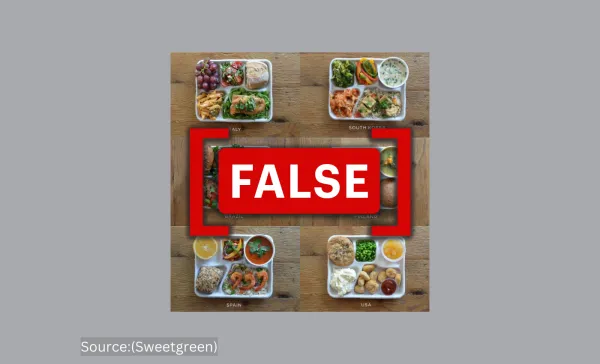By: Emincan Yüksel
August 17 2023

This photo does not show student meals in Rome, Italy; it is food chain Sweetgreen's advertisement campaign.
Context
On August 2, 2023, a social media account in Türkiye shared a post on X (formerly Twitter) allegedly showing a high school student's meal in Rome, Italy. The post amassed four million views, 2,300 reposts, and 19,100 thousand likes in around two weeks. The post contains three separate claims about the meals. The first is that the image shows the meals given to students in Rome; the second is that the meals are offered free of charge; and the third is that 98 percent of these meals are prepared from locally grown ingredients.
School environments often observe noticeable differences and inequalities, particularly socioeconomic disparities and different education policies. This incorporates nutrition, leading to countries frequently being compared in the media. Recent issues, such as the escalating cost of living in Türkiye and the initiative of providing free meals to five million students at the outset of this year, provide context as to why such claims spread easily.
In fact
The image shared within the tweet purportedly showcases the complimentary student meals provided to high school students in Rome, Italy. However, a reverse image search reveals that the source of this image originates from the blog page of Sweetgreen, a food chain known for its health-focused offerings. Sweetgreen, a restaurant chain specializing in nutritious products, initially shared similar images about countries such as South Korea, Brazil, Finland, Spain, and the U.S. back in 2014. These images aimed to shed light on the state of school lunches, particularly within the U.S.
The images were part of Sweetgreen's campaign to promote their "Sweetgreen in schools" program, which aimed to encourage healthier eating habits among school children and draw attention to the suboptimal conditions of school meals in the U.S.
In 2015, Sweetgreen updated this post and explained that the photographs were not prepared for criticism and were based on research published by the Associated Press (AP) in 2014.
Examples of school meals shared by AP from around the world reflect real moments reported in schools. However, it does not show the average student meals for the generally stated countries, but only the meals in the selected schools of the stated countries.
Are student meals free in Italy?
As for the claim that school meals in Italy are free, this is not true. The average student spends five euros on food while at school in Italy, with Rome’s average spend at three euros. The state compensates part of these fees for low-income families, but in Rome, the state support spent to cover the cost of food in this region is higher. In addition, there are various arrangements across different regions and municipalities in Italy.
The other claim states that 98 percent of food served in Italian schools comes from local farms. According to studies, since 2010, Italy has set aside money to add organic food to school menus. This follows agreements made with the World Health Organization and the European Union, leading to around 70 percent of the food on school menus in Rome being organic and from local farms.
The verdict
The image shared in the post does not show a free student meal in Rome, Italy. In fact, it was created as part of an advertising campaign for the company Sweetgreen. After its initial campaign statement, Sweetgreen revised it in 2015, clarifying that these images were not a complete reflection of actual school meals and were representative. Student meals are not free in Italy, and according to various sources, the proportion of organic foods incorporated into student meals is around 70 percent in the Rome region. Therefore, we have marked this claim as false.